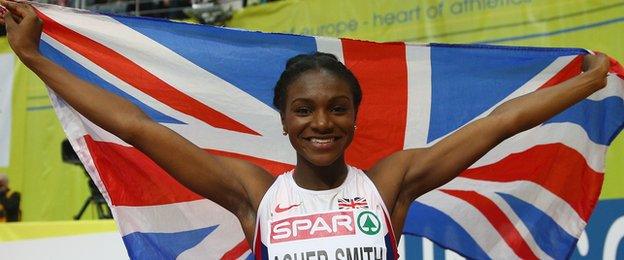Dina Asher-Smith, Britain's fastest woman: student and sprinter
- Published

Asher-Smith won the world junior 100m gold medal last year even though she tore a hamstring 20m from the line
History is not always achieved through perfection. Not everyone who becomes the first, the best or the greatest does so with a faultless performance. But then it is the history-makers who tell us this and they are the sort who are never satisfied.
On a late Sunday afternoon in the Netherlands, Dina Asher-Smith felt like she always does on a start line. "I love to race," she says. "I'm not an adrenaline junkie but I like feeling nervous. I like the thrill. A lot of the coaches laugh at me and tell me I'm crazy."
Having finished her first-year exams at King's College London six days earlier, the world junior sprint champion felt free.
And as she knelt on the track to prepare for the starter's gun, her coach's words were still reverberating in her ears. John Blackie had used his favourite phrase. "Don't hold the horses," he told his pupil, before sending her into battle.
The 19-year-old had no expectations of that summery May day in Hengelo. She isn't one for predictions. All the European indoor 60m silver medallist wanted to do was eradicate some of the inconsistencies which had been bothering her in training.
"I wanted to make sure I didn't tighten up, didn't panic, and went through some technical points successfully," says the athlete who only took sprinting seriously after winning world relay bronze in 2013.
Bang. The Briton catapults out of the blocks. But, as she rises, she is not at ease. "The start wasn't good, I popped out of my drive. I was thinking 'this is a mess'," she remembers.
The Londoner covers 20m, eats up another 30m, but by the time she is halfway down the track European 100m and 200m champion Dafne Schippers is preparing to overtake and Asher-Smith is annoyed: "I was thinking 'this isn't how I wanted it to go'. From that point on, I was just trying to tidy it up."
The benefit of being a sprinter is that by the time they wish a race over, it usually is. "I saw the line coming and I really wasn't happy," says the usually sanguine student.
Fortunately for the history undergraduate, her team-mate CJ Ujah - the man who last year, on the same track, became the fifth Briton to break the 10-second barrier - was waiting near the finish line.
"If he hadn't been there I probably would have left the track," says the Briton. "It wasn't awful, it wasn't abysmal, but it wasn't the race plan I intended to run and I was quite sad."
Asher-Smith: Studying history to making history | |
|---|---|
2013: Aged 17, Asher-Smith helps Britain's women win an unexpected bronze in the 4x100m relay at the World Championships. | 2014: Wins gold at the World Junior Championships, finishing 0.16 secs ahead of her nearest rival - the biggest winning margin at the event in 14 years. |
2014: Ends season at European Championships with 200m PB of 22.61 secs, beating the British junior record that had stood for 35 years. | 2015: Becomes the fastest teenager of all time over 60m when winning European indoor silver in a British record-equalling time. |
In assuming she had finished third, Asher-Smith looked at the scoreboard and noticed four digits - 11.02 - appear alongside the name of the second-placed athlete.
Gloom and regret lingered until Ujah told his friend that it was she who had come second, that it was she who had become the fastest British woman in history, bettering her personal best by 0.12 seconds and breaking the previous national record of 11.05 secs, set by Montell Douglas in 2008.
"I started jumping around," Asher-Smith remembers, laughing with ease.

Asher-Smith won silver at the European Indoor championships in Prague in a British record-equalling time
"I saw my mum and dad and bounced over to them. I was so so happy. I thought mum was going to cry, and she probably did knowing her. For them both to be there and see me break the British record meant a lot."
How does a teenager celebrate running quicker than any British female before her? By sitting in a nondescript room for 90 minutes, drinking, drinking, drinking, until her bladder filled up.
"I had to go straight to anti-doping and I couldn't pee," she says, giggling before apologising for being "disgusting", which sparks more laughter.
Did the other athletes being tested congratulate her? Was there a fist pump or a high-five, perhaps? No, but she would not have expected them to.
"They're from different countries and wouldn't have known it was a national record," she explains. "But my manager was there with me, bouncing up and down. When I got back to the hotel I had some dinner before the restaurant closed, saw a few people, and had to do a warm-down session in the pool. By the time that was finished it was 11pm. I had to be out of the hotel by 4am so I just packed, slept and left."
On her return to England there were hundreds of congratulatory messages, from athletes, friends and fans, on Twitter, Facebook and her phone. "It all went crazy," is Asher-Smith's take on the week that followed.

Asher-Smith said she got so many congratulatory tweets, Twitter was unable to notify her of all of them
For an athlete who likes to respond to every message she receives, the reaction to her record-breaking feat was overwhelming, and there was one message, from a school friend, which made her tearful. "She said I'd made Newstead Wood School proud and so many of my school friends either liked or commented on that message," Asher-Smith says, her voice still disbelieving.
"It made me grateful and I realised there are far more people wanting me to do well than I realised."
There were those who criticised the media coverage of the sprinter's achievement, saying she did not get the recognition she deserved. But Asher-Smith argues with equanimity on behalf of both sides, referencing the sports she had to compete with that day: the climax of the Premier League season, Test cricket, the Monaco Grand Prix, to name but a few.
"I didn't notice and I really don't know what my opinion on it is," she says. "But athletics, and female athletes, do have to battle for headlines."
Asher-Smith on the benefits of studying |
|---|
"I'm pleased I decided to not only do a degree but do one that isn't sport-related, and a subject that's quite demanding because if I've had a bad race, or a bad session, I don't have time to dwell on it. It's a saving grace because when I go back to athletics the next day, I'm refreshed because I haven't been watching videos, going over and over my performance. The degree gives me a balance, which makes life easier and prevents me going stir crazy. It's given me a more rounded perspective." |
Three years ago, when the nation was giddy on Olympic sports, Asher-Smith was entering and leaving the Olympic stadium as an unknown charged with carrying boxes of kit for those she hoped, one day, to emulate. She accepts she has come a long way in a short time.
"I definitely wouldn't have imagined I'd be a British record holder back then, but I don't want to reflect on it too much because you get caught up in the moment," she says, before discussing the difficulties of juggling studying with training.
School is out for the summer, allowing Asher-Smith to concentrate on her sport without the distraction of revising, for example, for a module on medieval Europe, which gave her a headache. The intensity of her training will remain the same because the fastest teenager in the world has an elite athlete's regime: usually a two-hour session at Norman Park track in Bromley between 7pm and 9pm after a day of lectures and study.
"The training and University schedules have both been challenging, but if I want to do well in both I can't let either slip," she says, hinting at the work ethic which allowed her to achieve straight As in her A-levels last year, whilst also training to become world junior 100m champion and a European 200m finalist.

Asher-Smith says the competition in the British team spurs her on
Asked what her targets are for the rest of the season, the fastest woman in Britain does not set her sights on conquering the world but on a place in the national team at this summer's World Championships.
Fighting with her for a place in Beijing are a number of high-class sprinters: Jodie Williams, the 200m Commonwealth Games silver medallist, Bianca Williams - a Commonwealth 200m bronze medallist - and European 100m bronze medallist Ashleigh Nelson. Asha Philip, the third quickest British female in history, is also a contender.
"It might sound underwhelming but, with how sprinting is now in the UK, it's definitely a challenge to make the team," says Asher-Smith, who will take on Allyson Felix and Shelly-Ann Fraser-Pryce in the 200m this Sunday at the Birmingham Grand Prix., external
"Maybe if I was in a different country, a different environment, maybe I could look beyond qualification but I definitely can't take my place on the team for granted."
Watch live coverage of the Birmingham Grand Prix online and on BBC Two from 13:30 BST (15:55 in Northern Ireland) on Sunday, 7 June.
- Published2 June 2015

- Published10 September 2015

- Published24 May 2015

- Published8 February 2019
